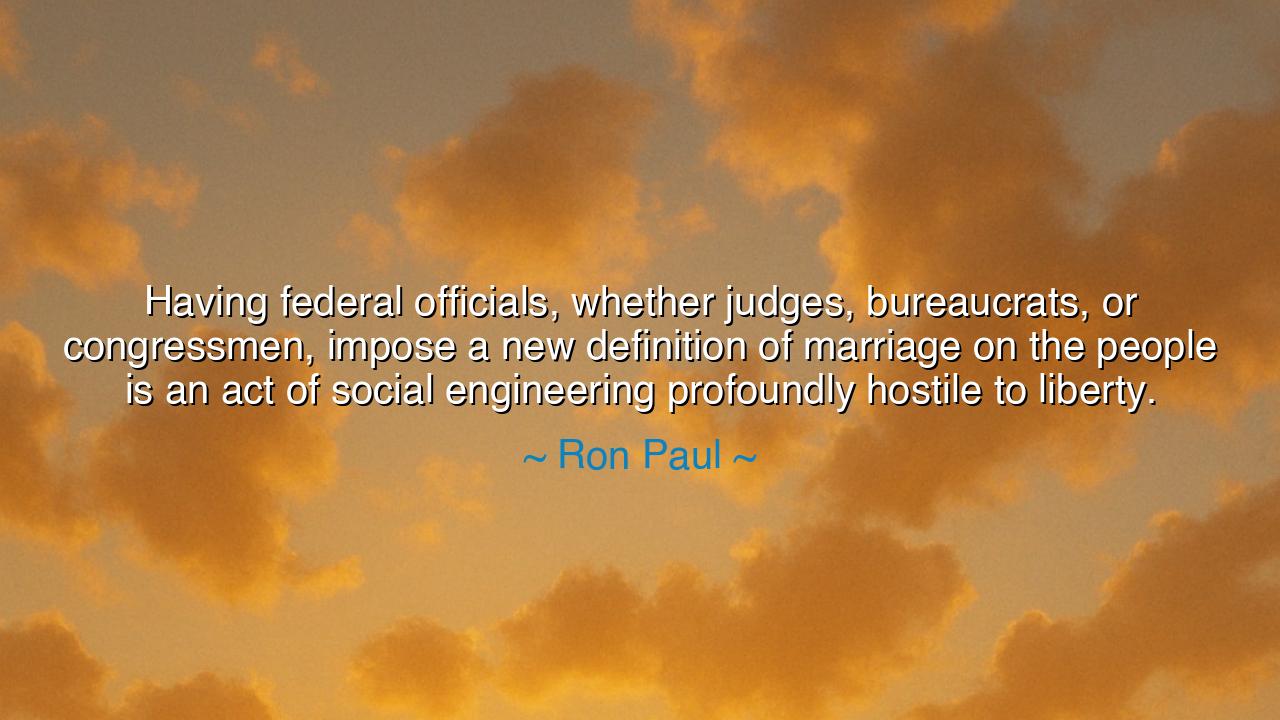
Having federal officials, whether judges, bureaucrats, or
Having federal officials, whether judges, bureaucrats, or congressmen, impose a new definition of marriage on the people is an act of social engineering profoundly hostile to liberty.






When Ron Paul declared, “Having federal officials, whether judges, bureaucrats, or congressmen, impose a new definition of marriage on the people is an act of social engineering profoundly hostile to liberty,” he was not simply speaking about the laws of marriage—he was invoking the eternal struggle between freedom and authority, between the natural order of communities and the artificial control of distant powers. His words, born of conviction, stand as a warning against the arrogance of those who would shape the lives of men and women by decree rather than consent. To Paul, true liberty is not given by government; it is inherited from nature and conscience, and it withers whenever rulers presume to redefine what life and love mean for the people.
The meaning of this quote lies in the principle that freedom begins where compulsion ends. Paul’s statement is not merely about marriage—it is about sovereignty, the right of individuals and communities to define their own moral and social truths without interference from those who wield authority in faraway halls. In his eyes, when government officials impose definitions from above, they do not protect liberty; they destroy it, replacing the organic wisdom of the people with the cold abstraction of bureaucracy. His words echo the ancient belief that order must arise from the ground up, not the top down—that the family, the village, and the conscience of the free man are the first and truest foundations of civilization.
To understand his conviction, one must see the shadow of history that informs it. The phrase “social engineering” is not new—it has long described the attempt of rulers and ideologues to reshape society according to their own image, often with tragic results. The ancient tyrants of empire sought to control not only the lands of their subjects but their thoughts and customs as well. The philosopher Plato, in his Republic, imagined a perfect city ruled by philosopher-kings who would dictate every aspect of life, even the bonds of family and love. Though noble in theory, such control, when tested in reality, has always led to bondage. Ron Paul’s warning is thus timeless: whenever power claims the right to redefine human relationships, it becomes not a servant of liberty but its enemy.
History is filled with examples of what happens when the natural order is supplanted by decree. Consider the story of the Soviet Union, where the state sought to dissolve the sanctity of the family and redefine marriage as an instrument of ideology. Love became secondary to loyalty; children were taught to honor the state above their parents. What began as a promise of equality turned into the erasure of individuality. The family—once a sacred haven—became an extension of government policy. This is the kind of social engineering Paul warns against: the belief that freedom can be improved by control, that the state knows better than the people what their traditions should be. The result, as history has shown, is always the same—spiritual poverty beneath the illusion of progress.
At the heart of Paul’s words lies a deeper reverence for liberty itself. To him, liberty is not chaos—it is a moral order sustained by voluntary bonds, by respect, and by faith. When government overreaches and dictates what marriage or family should mean, it assumes a divine authority it was never meant to have. The ancients would have called this hubris—the sin of men who believe themselves wiser than the natural law. And like all hubris, it ends in ruin. The lesson, then, is not that tradition should never change, but that change must arise freely, through persuasion, through dialogue, through the collective will of those who live under its consequences—not through the imposition of power.
In his time, Ron Paul stood as a voice for a principle that resonates through the ages: that liberty cannot survive without moral autonomy. To defend freedom, one must defend the right of the people to govern the intimate and sacred spaces of their own lives. Whether one agrees with his view on marriage or not, the heart of his message is universal—that when authority becomes arrogant, when it replaces the consent of the governed with the commands of the powerful, the flame of liberty dims. And once extinguished, it is not easily rekindled.
So, my child, take this wisdom to heart. Do not look to rulers to define the truths of your life; seek them within your conscience, within your family, within your faith. Question those who promise safety at the cost of freedom, and beware of those who would shape your destiny by law rather than by love. The freedom to live according to one’s conviction is the breath of the human soul. As Ron Paul reminds us, every act of imposed definition is a theft of that breath, a quiet strangling of the spirit of man. Defend liberty, then—not only in the courts and the streets, but in the home and the heart. For freedom is not granted by the powerful—it is guarded by the courageous.






AAdministratorAdministrator
Welcome, honored guests. Please leave a comment, we will respond soon